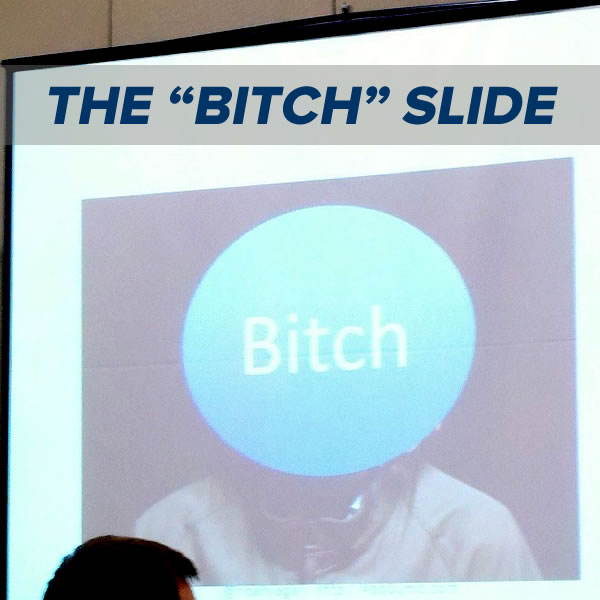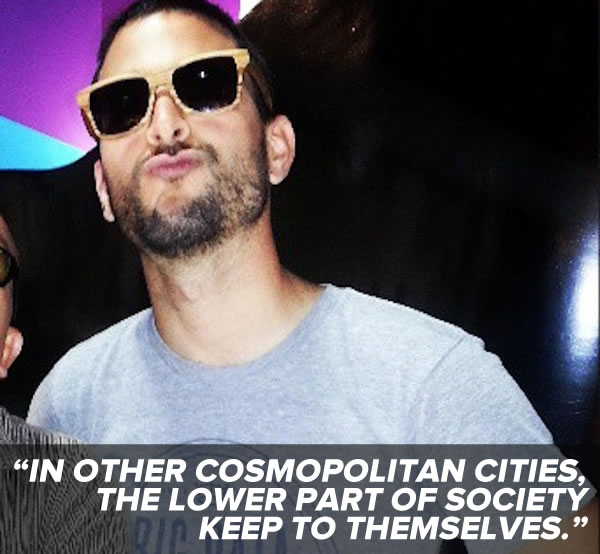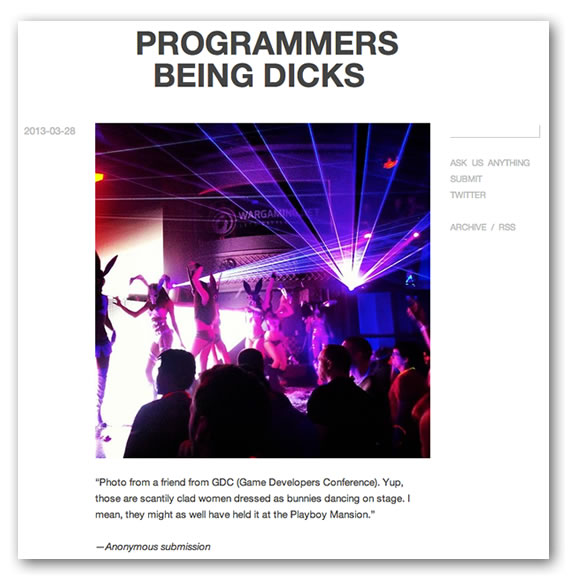Here’s a classic piece of not-so-savory tech culture. It’s a video featuring Jakob Lodwick, then a partner at Connected Ventures, the people behind CollegeHumor, Busted Tees and Vimeo, giving a grand tour of the office. He opens the tour by emphasizing that the office is full of “young, vibrant” people — he was in his twenties at the time. Around the 4:35 mark, the video goes deeper into the topic of “old people” — that they just don’t get the internet and can’t come up with new ideas. To help save your startup from the scourge of “The Olds”, Lodwick proceeds to give the viewer tips on how to use slinkies to get rid of old people, and even an example of how they harassed an older employee into leaving. After all, you need to replace them with young people with “vibrant new ideas” and who just oh-so-conveniently happen to be in Lodwick’s demographic:
It’s hard to tell how much of this in tongue–in-cheek — in fact, Lodwick himself may not be too sure how much of what he said is tongue-in-cheek. It’s part of the zeitgeist, in this age where not only young influential-if-douchey techies like Facebook CEO Mark Zuckerberg declare that “Young people are just smarter”, but even older ones as well: witness Dave Winer’s recent “Only hire young males, but I didn’t say it” piece, which he wrote at the sprightly age of 58. It highlights a long-standing problem in Silicon Valley: they’ve got an ageism problem, and it’s getting sillier.
Memo to Connected Ventures: Maybe it’s time to get this video taken down, for PR’s sake. Just sayin’.
In a recent article in The New Republic titled The Brutal Ageism of Tech, there’s an interview with Dr. Seth Matarasso — described in the article as “a reality-show producer’s idea of a cosmetic surgeon”, who says “Love me, mean it,” instead of “goodbye” — who has a practice in San Francisco. A lot of his work lately has come from men in the tech industry who need to look younger in order to get ahead. Worse still, the men coming to see him are getting younger; he’s turned away applicants still in their twenties.
Hey, I’m no opponent of youthful vigor, but it’s not the only thing. There’s a lot to be said for being seasoned and having experience too. Besides, twenty-somethings creating products that twenty-somethings will buy may be profitable in the short term, but may turn out to be bad for products in the long run, as the New York Times points out.
If it’s good not to be old in the Valley, it’s also good not to be a woman. From people using photos of their ex-girlfriends in presentations with their faces blotted out and replaced with the word “bitch”, to Julie Ann Horvath’s departure from GitHub, to the threats directed against Adria Richards, to the guys at Penny Arcade and their “Dickwolves” shenanigans, and the general formula for treating women in tech, it’s no wonder that PC’s Sascha Segan doesn’t want his daughter working in Silicon Valley.
If’s it’s not good to be old or a woman in the Valley, it’s also good not to be poor, and that’s “poor” from a techie’s point of view. From the Google Bus culture/class war to Greg Gopman’s Facebook rant about how the homeless won’t stay in their place (and the chorus of me-too’s) to Sarah Lacy’s unsympathetic view of the people who are too damn lazy to build a tech company and just operate public transit instead to know-nothing libertarian (which increasingly is losing its original intent and becoming “freedom for me, corporate control for thee”) suggestions that 911 emergency calls come with a charge of $100 to “weed out the noise”, there’s this growing notion in the Valley (and hey, Wall Street too) that bad bank balances mean bad character, that not getting paid nice techie wages is some kind of punishment for a moral failing.
There are enough stories about programmers being dicks that there’s a Tumblr called — wait for it — Programmers Being Dicks.

What’s it going to take for us to pull our own entitled heads out of our entitled asses? It’s going to take some effort, empathy — be sure to read Reg “raganwald” Braithwaite’s excellent piece on the subject — and the courage to speak out whenever this kind of dickery pops in our industry. It’s not easy, but hey, neither is programming, and we’re up for that challenge, right?





8 replies on “It’s time to fix tech culture”
Not you too. Did someone steal your brain. I can’t believe you’re slamming me too. Read the piece. Don’t be part of a stupid mob. I thought you were better than that.
Dave Winer: Hey, Dave!
I’m happy to veer off from the herd — I am living in “the worst state” now — and I’ll happily make corrections, but it’s hard to find other interpretations for “But every time a company hires someone who is not a young male, they run the risk that the new hire isn’t there to work, rather is there to scam you.”
Love this Joey – thanks. Impressed that you pulled all of this content into old place. As an old chick in Silicon Valley, I can tell you firsthand that there’s a ton of punks out here. And getting worse. Feels like we’re heading to another “stupid cash” bubble like we did in 2000.
Let me venture a Unified Theory of Tech World Awfulness:
Let’s say there was a thing in your house that constantly reminded you that you’d get old and weak and die. Also, that thing also makes you feel pretty stupid. What would you do with it?
Or, let’s say there’s a thing in your house that shows you all the many ways you fail terribly to live up to the grand vision you have always had of yourself.
If you’re an adult, you realize that those things are called “mirrors” and it’s pretty infantile to avoid them. Also, if you try to do that out in public, you’ll look like a fool. Or a vampire.
But, if you’re a big baby, you’d avoid those things. Your little bitty baby feelings would mean that you couldn’t just accept that you’re too afraid to face a *thing*. It’s just a thing, after all. So to save face, you make a huge fuss about how those things are just so terrible, they don’t deserve to be in your house. The bigger, and more public, the fuss… the better. That way you’ll feel validated, instead of cowardly. Even though, of course, you know it’s a lie.
That’s what’s going on here, if you ask me. Obviously, the first “thing” is a metaphor for older workers, and the second for women… at least for pathetic, narcissistic straight dudes.
Sub-clinical narcissism isn’t characterized by grandiosity — e.g. egomania — but by viewing every event and every other person on the planet not as an individual, but as a bit part in The Drama Of Me. Or, some say poetically, a mirror. In other words, viewing people as things, to be angled and buffed and re-ground and manipulated. Not separate human beings with feelings etc. (Unless those feelings can be exploited to the narcissist’s ends, of course.)
In other words, “What does THIS/do YOU mean about ME?” every second of every day. Exhausting.
And, if you’re sad and incapable and empty inside… mirrors are terrifying. Especially if they’re smarter than you and wiser than you, they will show you for who you really are.
IMO, it’s not that it’s “the tech world” specially, but that narcissists are everywhere, and narcissists especially love to manipulate people like things, and people are complex, and therefore complex things that they can manipulate are also very attractive. Alas, “things they can manipulate” is the very textbook definition of programming.
It’s also the definition of a lot of other things, like education, medicine and politics, but people there are forced by expensive schooling and seriously punitive norms to pretend that they don’t like the manipulation best of all.
I think our narcissists are the DUMBEST narcissists. Thank goodness for that. Powerful narcissists manage those around them, weak ones must figure out strategies to keep the stronger personalities at bay.
Tech Narcissists were lured in by the promise of easy riches just for “being smart” and stroking that tells them they’re special, like caged lions, too good, too precious to work in a job or work on anything long-term and stick with it or lol that stuff is for old people and women. (In short: they are baby narcissists being manipulated by masters.)
And they work themselves to death because they are literally that empty.
So the question becomes:
Should we harass and punish them until they wise up and hide it?
Or… be glad that they’re so dumb they let it all hang out?
I’m of the opinion that outing them and their tactics to the people they “hate” (the scary scary mirrors!) is the place to start, followed up by educating people how not to fall for their tricks, and then, helping non-narcs build businesses & structures to circumvent them.
I mean, really, when you examine the lifestyles and accumulated comments of these startup ceos et al, the picture is pretty clear. And it’s pretty pathetic. Most people who might be fooled by momentary sparkle will end up disgusted. They don’t want to be like that.
That’s how I approach my anti-startup business writing, for example, and that makes an impact in that it helps my readers see thru the myths and then create something for themselves, instead of selling themselves to the aforementioned system.
Nothing enrages a narcissist more than people just gettin’ on gettin’ on… without him.
I meant to add: It’s better that their idiotic posturing currently takes place in the light. That way we can point at it, and use it to educate the people who *can* change… people who would otherwise end up as narcissists’ fodder.
Forcing the tech narcissists to hide their behavior will only make them craftier & more covert.
[…] It’s time to fix tech culture — Global Nerdy. […]
http://youtu.be/0FV1hp92JXg
@joey technically this extract from Dave is true.
He does not say that you will be, but that it is possible.
And he is grounded in that not by virtue of potential possibility but also from actual experience.
What is striking his how his article is subverted and lead to a conclusion which only exists in the accuser’s mind.
This is the tend in anglosaxon world: don’t talk, don’t day anything, otherwise some mob will extrapolate with their own twisted mind and accuse you of their own turpitudes.
That leads to a dual world: one with only fake representation.
And one with reality whose knowledge is only shared among private elite.
This will of not offending is actually not very moral at all, at least in some culture.